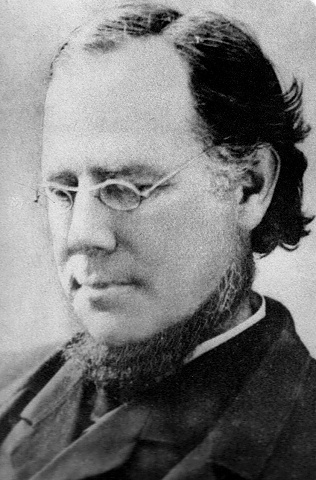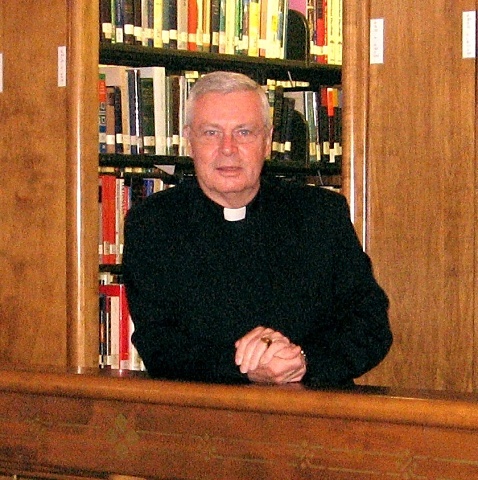October 9, 2012
This is the twenty-fourth in a series of previously unpublished reflections from the 1854 spiritual notebook of Paulist Founder, Servant of God Father Isaac T. Hecker. The reflection series is being made pubic in conjunction with Father Hecker’s cause for canonization. Father Paul Robichaud, CSP, Paulist historian and postulator for Father Hecker’s cause for sainthood, offers a response to Father Hecker’s reflection.

God is God and upon this evident fundamental truth, all true spiritual life, in the last analysis exists, and all true hope is based. God is God and will cause each one of us to bring forth fruit in his own kind and in due season. God is God, and for the rest, when we are what our conscience demands of us, God would have us to be without anxiety. Be not anxious for the work of holiness is not so much your work but the work of God in you. Throw your cares upon Him. You are not able to carry it but God is. Give yourself to God entirely and unreservedly, and as for the rest, all other things will take care of themselves. The only thing you have to do secure heaven, therefore to be successful in this world is to place unconditional trust in God.
One day St. Philip Neri was heard to say by a friend of his, “I despair, I despair.” “How so,” said his friend, “that you despair?” “I despair of myself,” said the saint, “but place my entire trust in God.” The corollary of placing your entire trust in God is to place your entire mistrust in yourself. To always be conscious of our entire dependence on God for what we are, have and hope for is the source of our confidence in God and the basis of true humility. For the one who trusts totally in God, so God trusts totally in him. The measure of our wishes, whatever they may be, if they are not in God, so they are the measure of our mistrust in the supreme goodness and all watchful care of divine Providence.

Servant of God Father Isaac Hecker was a man of profound hope. His writing makes continual reference to “confidence in God,” “the providence of God,” “the goodness of God,” “the presence of God,” and today’s reflection, “hope.” In First Thessalonians and First Corinthians, the Apostle Paul describes hope together with faith and love as the three great virtues that intertwine in the work of Jesus and his disciples. While love is the greatest of these virtues, love depends on faith and hope. We are people of faith because we trust in the promise of Jesus that he will bring us into newness of life. We are people of hope despite the present difficulties we face in our lives because all things have been overcome in the death and rising of Jesus. Faith and hope give us the foundation to love unreservedly as Jesus loves; the greatest of these virtues.
Father Hecker in today’s reflection says we hope because God is present in our lives with power. He uses the phrase “God is God.” And what he means; is that God has a plan for our lives and our world. Father Hecker says that we can trust in God to assist us in living lives of faith, hope and love. “Throw your cares upon God. You are not able to carry it but God is.” Fear and anxiety is what erodes hope, so do not be anxious as God is directing the course of our lives. All the rest will take care of itself. Our part of discipleship is to totally trust in faith, endure in hope and respond in love. When we do this we participate in God’s plan. Father Hecker ends by reminding us that when we don’t get what we want, the problem is us and not God. He says, “the measure of our wishes, whatever they may be, if they are not in God, so they are the measure of our mistrust in God. As an old friend often said to me when I would get frustrated, “with God you never get what you expect but you always get more than you bargained for.”
About Father Isaac Hecker’s 1854 Spiritual Notebook:
Servant of God, Father Isaac Hecker wrote these spiritual notes as a young Redemptorist priest about 1854 and they have never been published. Hecker was 34 years old at the time, and had been ordained a priest for five years. He loved his work as a Catholic evangelist. The Redemptorist mission band had expanded out of the New York state area to the south and west, and the band’s national reputation grew. Hecker had begun to focus his attention on Protestants who came out to hear them. To this purpose Hecker began to write in 1854 his invitation to Protestant America to consider the Catholic Church, “Questions of the Soul” which would make him a national figure in the American church.
Hecker collected and organized these notes that include writings and stories from St. Alphonsus Liguori, the Jesuit spiritual writer Louis Lallemant and his disciple Jean Surin, the German mystic John Tauler, St. Thomas Aquinas and St. Jane de Chantal among others. These notes were a resource for retreat work and spiritual direction and show Hecker’s growing proficiency in traditional Catholic spirituality some ten years after his conversion to the Catholic faith. They are composed of short thematic reflections.